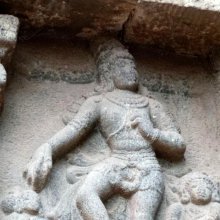Janita, Janitā: 15 definitions
Introduction:
Janita means something in Hinduism, Sanskrit, Buddhism, Pali, Marathi, Hindi. If you want to know the exact meaning, history, etymology or English translation of this term then check out the descriptions on this page. Add your comment or reference to a book if you want to contribute to this summary article.
Alternative spellings of this word include Janit.
Images (photo gallery)
In Hinduism
Natyashastra (theatrics and dramaturgy)
Source: Wisdom Library: Nāṭya-śāstra1) Janita (जनित).—One of the 108 karaṇas (minor dance movement) mentioned in the Nāṭyaśāstra chapter 4. The instructions for this janita-karaṇa is as follows, “one hand to be on the chest, the other hanging loosely and observing Talāgrasaṃsthitā (Janitā) Cārī.”.
A karaṇa represents a minor dance movements and combines sthāna (standing position), cārī (foot and leg movement) and nṛttahasta (hands in dancing position).
2) Janitā (जनिता) refers to a one of the thirty-two cārīs, according to the Nāṭyaśāstra chapter 11. The Janitā-cārī is classified as a bhaumī, or “earthly”, of which there are sixteen in total. The term cārī refers to a “dance-step” and refers to the simultaneous movement of the feet (pāda), shanks (jaṅghā) and the hip (ūru). From these cārīs proceed dance as well as movements in general.
Source: archive.org: Natya ShastraJanitā (जनिता).—A type of earthly (bhaumī) dance-step (cārī);—Instructions: a Muṣṭi hand held on the breast and another hand moved round, and the feet to be Talasañcara.

Natyashastra (नाट्यशास्त्र, nāṭyaśāstra) refers to both the ancient Indian tradition (shastra) of performing arts, (natya—theatrics, drama, dance, music), as well as the name of a Sanskrit work dealing with these subjects. It also teaches the rules for composing Dramatic plays (nataka), construction and performance of Theater, and Poetic works (kavya).
Jyotisha (astronomy and astrology)
Source: Wisdom Library: Brihat Samhita by VarahamihiraJanita (जनित) refers to the “commencement” (of an eclipse), according to the Bṛhatsaṃhitā (chapter 5), an encyclopedic Sanskrit work written by Varāhamihira mainly focusing on the science of ancient Indian astronomy astronomy (Jyotiṣa).—Accordingly, “If there should be both lunar and solar eclipses in one month, princes will suffer both from dissensions among their own army and from wars. [...] These evil effects, resulting from planetary look at eclipsed disc, apply as well to the time of termination of the eclipse as to its commencement [i.e., graha-janita]. If Jupiter, a beneficent planet, should also see the eclipsed disc, the evils described will vanish in just the same way as the flame of fire dies out when water is poured over it”.

Jyotisha (ज्योतिष, jyotiṣa or jyotish) refers to ‘astronomy’ or “Vedic astrology” and represents the fifth of the six Vedangas (additional sciences to be studied along with the Vedas). Jyotisha concerns itself with the study and prediction of the movements of celestial bodies, in order to calculate the auspicious time for rituals and ceremonies.
Shaivism (Shaiva philosophy)
Source: Brill: Śaivism and the Tantric Traditions (philosophy)Janita (जनित) refers to the “arising (of inference)” according to the Utpaladeva’s Vivṛti on Īśvarapratyabhijñākārikā 1.5.8-9.—Accordingly, “For inference is a concept, and this [concept] arises thanks to the residual trace [left by] a previous experience; so to begin with, [it] depends on the fact that the object was directly perceived [at some point] in the past, and inference is a conceptual cognition that arises as an unfailing (avyabhicāra-janita) [means of knowledge] with respect to this [previously perceived] object. [...]”.

Shaiva (शैव, śaiva) or Shaivism (śaivism) represents a tradition of Hinduism worshiping Shiva as the supreme being. Closely related to Shaktism, Shaiva literature includes a range of scriptures, including Tantras, while the root of this tradition may be traced back to the ancient Vedas.
Languages of India and abroad
Pali-English dictionary
Source: BuddhaSasana: Concise Pali-English Dictionaryjanita : (pp. of janeti) generated; produced.

Pali is the language of the Tipiṭaka, which is the sacred canon of Theravāda Buddhism and contains much of the Buddha’s speech. Closeley related to Sanskrit, both languages are used interchangeably between religions.
Marathi-English dictionary
Source: DDSA: The Molesworth Marathi and English Dictionaryjanita (जनित).—p (S) Born, formed, produced, caused, made. In comp. Ex. krōdhajanitasantāpa, sampattijanita- garva, bhayajanita, lōbhajanita, śōkajanita.
--- OR ---
janitā (जनिता).—m S Creator, former, causer, author, father.
Source: DDSA: The Aryabhusan school dictionary, Marathi-Englishjanita (जनित).—p Born, made, produced.
--- OR ---
janitā (जनिता).—m Creator, author, father, causer.
Marathi is an Indo-European language having over 70 million native speakers people in (predominantly) Maharashtra India. Marathi, like many other Indo-Aryan languages, evolved from early forms of Prakrit, which itself is a subset of Sanskrit, one of the most ancient languages of the world.
Sanskrit dictionary
Source: DDSA: The practical Sanskrit-English dictionaryJanita (जनित).—a. [jan-ṇic-kta]
1) Given birth to.
2) Produced, created.
3) Occasioned, occurred, happened &c.
Source: Cologne Digital Sanskrit Dictionaries: Edgerton Buddhist Hybrid Sanskrit DictionaryJanitā (जनिता).—(or °ta ?), sg. or pl., = Sanskrit janatā, people: daśakuśalī janitā (Calcutta (see LV.) °tāḥ) thapitā te brahmapatheṣu Lalitavistara 169.11 (verse); tvayi purimā janitā (here Calcutta (see LV.) janatā) ima dṛṣṭvā dṛṣṭivipannā 169.17 (verse); in both Tibetan skye bo = man, men, people. The meaning seems clearly that of janatā, but no ms. seems to read so. No record of such a form elsewhere; compare Sanskrit jani, birth, life.
Source: Cologne Digital Sanskrit Dictionaries: Shabda-Sagara Sanskrit-English DictionaryJanita (जनित).—mfn.
(-taḥ-tā-taṃ) 1. Engendered, begotten. 2. Occasioned, occurring, produced. E. jan to be born, causal form, ṇic kta aff.
Source: Cologne Digital Sanskrit Dictionaries: Monier-Williams Sanskrit-English Dictionary1) Janita (जनित):—[from jananīya] mfn. born, [Harivaṃśa 9238]
2) [v.s. ...] engendered, begotten, [Horace H. Wilson]
3) [v.s. ...] produced, occasioned, [Mahābhārata iv, 1 236; Pañcatantra; Meghadūta] etc.
4) [v.s. ...] occurring, [Horace H. Wilson]
Source: Cologne Digital Sanskrit Dictionaries: Yates Sanskrit-English DictionaryJanita (जनित):—[(taḥ-tā-taṃ) p.] Produced.
Source: DDSA: Paia-sadda-mahannavo; a comprehensive Prakrit Hindi dictionary (S)Janita (जनित) in the Sanskrit language is related to the Prakrit word: Jaṇia.
Sanskrit, also spelled संस्कृतम् (saṃskṛtam), is an ancient language of India commonly seen as the grandmother of the Indo-European language family (even English!). Closely allied with Prakrit and Pali, Sanskrit is more exhaustive in both grammar and terms and has the most extensive collection of literature in the world, greatly surpassing its sister-languages Greek and Latin.
Hindi dictionary
Source: DDSA: A practical Hindi-English dictionaryJanita (जनित) [Also spelled janit]:—(a) produced/generated (by); caused (by), procreated (by).
...
Kannada-English dictionary
Source: Alar: Kannada-English corpusJanita (ಜನಿತ):—[adjective] that has come into existence; brought into life or being; born; produced; generated; begotten.
--- OR ---
Janita (ಜನಿತ):—
1) [noun] the act or fact of coming into life or of being born; birth.
2) [noun] (dance.) one of the one-hundred-eight coordinated movements of hands and feet.
3) [noun] (dance.) one of the sixteen movements on the ground.
Kannada is a Dravidian language (as opposed to the Indo-European language family) mainly spoken in the southwestern region of India.
See also (Relevant definitions)
Starts with: Janitar, Janitasvana, Janitavya.
Ends with: Agamajanita, Amtarjanita, Avajanita, Ayonijanita, Devajanita, Jalanidherjanita, Janajanita, Kupurushajanita, Manojanita, Phanijanita, Prajanita, Samjanita, Samupajanita, Sanjanita, Suratajanita, Svabhavajanita, Tajjanita, Ujjanita, Vijanita, Virahajanita.
Full-text (+21): Janitasvana, Avajanita, Janitodyama, Svabhavajanita, Vijanita, Svabhava, Virahajanita, Samjanita, Suratajanita, Jania, Kupurushajanita, Janit, Kutuhala, Parishkrita, Upanetar, Swabhav, Virah, Janitravati, Iheha, Upanetri.
Relevant text
Search found 36 books and stories containing Janita, Janitā; (plurals include: Janitas, Janitās). You can also click to the full overview containing English textual excerpts. Below are direct links for the most relevant articles:
Garga Samhita (English) (by Danavir Goswami)
Verse 5.9.39 < [Chapter 9 - The Happiness of the Yadus]
Verse 1.12.27 < [Chapter 12 - Description of Śrī Nanda’s Festival]
Brihad Bhagavatamrita (commentary) (by Śrī Śrīmad Bhaktivedānta Nārāyana Gosvāmī Mahārāja)
Verse 2.4.184 < [Chapter 4 - Vaikuṇṭha (the spiritual world)]
Verse 1.4.114-115 < [Chapter 4 - Bhakta (the devotee)]
Verse 1.7.43 < [Chapter 7 - Pūrṇa (pinnacle of excellent devotees)]
Vakyapadiya of Bhartrihari (by K. A. Subramania Iyer)
Verse 2.146 < [Book 2 - Vākya-kāṇḍa]
Verse 2.392-393 < [Book 2 - Vākya-kāṇḍa]
Verse 3.9.101 < [Book 3 - Pada-kāṇḍa (9): Kāla-samuddeśa (On Time)]
Rig Veda (translation and commentary) (by H. H. Wilson)
Sahitya-kaumudi by Baladeva Vidyabhushana (by Gaurapada Dāsa)
Text 10.207 < [Chapter 10 - Ornaments of Meaning]
Natyashastra (English) (by Bharata-muni)

